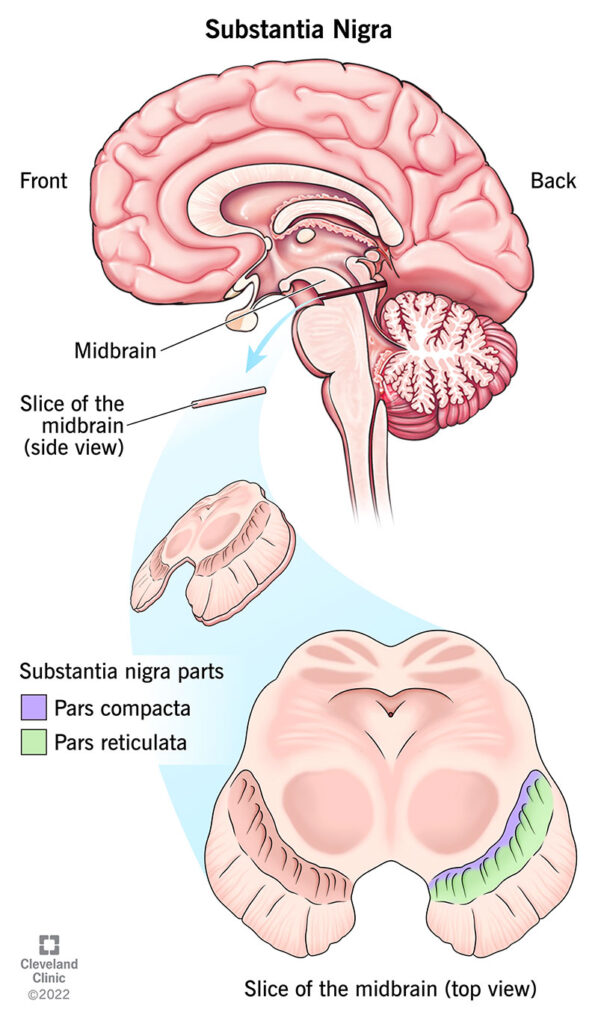Dementia and Parkinson’s disease are two neurodegenerative disorders that share similarities and can sometimes coexist in individuals. Although they are distinct conditions, there is a link between the two.
Research suggests that individuals with Parkinson’s disease have an increased risk of developing dementia. In fact, studies have shown that up to 80% of people with Parkinson’s disease eventually develop dementia.
The exact nature of the relationship between dementia and Parkinson’s is still not fully understood. However, it is believed that the accumulation of abnormal proteins in the brain, such as alpha-synuclein, plays a role in both conditions.

Furthermore, certain regions of the brain affected by Parkinson’s disease, such as the substantia nigra, are also involved in cognitive processes and memory. This overlap in brain regions may contribute to the development of dementia in Parkinson’s patients.
It is important to note that not all individuals with Parkinson’s disease will develop dementia and the severity and progression of symptoms can vary widely between individuals. However, understanding the link between the two conditions can help improve diagnosis and treatment strategies.
Diagnosis and Treatment Options for Dementia in Parkinson’s Disease
Diagnosing dementia and Parkinson’s disease requires a comprehensive evaluation by a healthcare professional. This typically involves a thorough medical history, physical examination, and various cognitive and movement tests.
Treatment options for dementia and Parkinson’s disease focus on managing symptoms and improving quality of life. Medications may be prescribed to help control motor symptoms in Parkinson’s disease, while cognitive-enhancing drugs can be used to alleviate some symptoms of dementia.
Additionally, lifestyle modifications such as regular exercise, a healthy diet, and mental stimulation can help slow down the progression of both conditions. Supportive therapies such as physical therapy, occupational therapy, and speech therapy may also be beneficial in managing symptoms and improving overall functioning.
It is important for individuals with dementia and Parkinson’s disease to work closely with their healthcare team to develop a personalized treatment plan that addresses their specific needs and goals.
Lewy Body Dementia and Parkinson’s Disease Relationship
Parkinson’s disease (PD) and a specific type of dementia called Lewy body dementia (LBD) are also closely related because they both involve the presence of abnormal protein deposits in the brain called Lewy bodies. These Lewy bodies contain a protein called alpha-synuclein.
In Parkinson’s disease, Lewy bodies primarily accumulate in the substantia nigra region of the brain, leading to the death of dopamine-producing neurons. This results in the characteristic motor symptoms of PD, such as tremors, stiffness, and difficulty with movement.
In Lewy body dementia, Lewy bodies are found in multiple areas of the brain, including the cerebral cortex. This widespread distribution leads to not only motor symptoms similar to PD but also cognitive and psychiatric symptoms, such as fluctuating cognition, visual hallucinations, and REM sleep behavior disorder.
While Parkinson’s disease and Lewy body dementia are distinct clinical entities, they share many overlapping features and some individuals may initially present with Parkinson’s symptoms before developing cognitive decline characteristic of LBD. This overlap suggests that they may represent different points on a spectrum of Lewy body disorders rather than completely separate conditions.

Lifestyle Changes to Manage Dementia
Making certain lifestyle changes can greatly contribute to managing dementia symptoms and improving overall well-being. Some lifestyle modifications that may be beneficial include:
- Regular physical exercise: Engaging in activities such as walking, swimming, or yoga can help improve cognitive function and enhance mood.
- Healthy diet: Consuming a balanced diet rich in fruits, vegetables, whole grains, lean proteins, and healthy fats can support brain health and reduce the risk of cognitive decline.
- Mental stimulation: Engaging in mentally stimulating activities such as puzzles, reading, and learning new skills can help maintain cognitive function.
- Social engagement: Staying socially active and maintaining strong social connections can help prevent feelings of isolation and loneliness, which are common in individuals with dementia.
- Adequate sleep: Getting enough sleep is essential for overall brain health and optimal cognitive function.
It is important to consult with healthcare professionals before making any significant lifestyle changes to ensure they are appropriate for an individual’s specific condition and needs.
Support Systems for Individuals with Dementia
Living with dementia can be challenging for both individuals and their caregivers. Having a strong support system in place is crucial for managing the condition and maintaining a good quality of life.
Support systems for individuals with dementia may include:
- Caregiver support groups: Joining support groups can provide caregivers with valuable information, resources, and emotional support.
- Professional assistance: Seeking help from healthcare professionals, such as home health aides or respite care providers, can alleviate some of the caregiving responsibilities and provide much-needed breaks.
- Safety measures: Implementing safety measures at home, such as installing handrails, removing tripping hazards, and using medication management systems, can help prevent accidents and ensure a safe environment.
- Memory aids: Using memory aids such as calendars, reminder apps, and labeled drawers can help individuals with dementia remember important information and tasks.
- Emotional support: Encouraging open communication and providing emotional support to individuals with dementia can help reduce feelings of frustration, anxiety, and depression.
By establishing a strong support system, individuals with dementia can feel more empowered, while their caregivers can receive the assistance and guidance they need.








